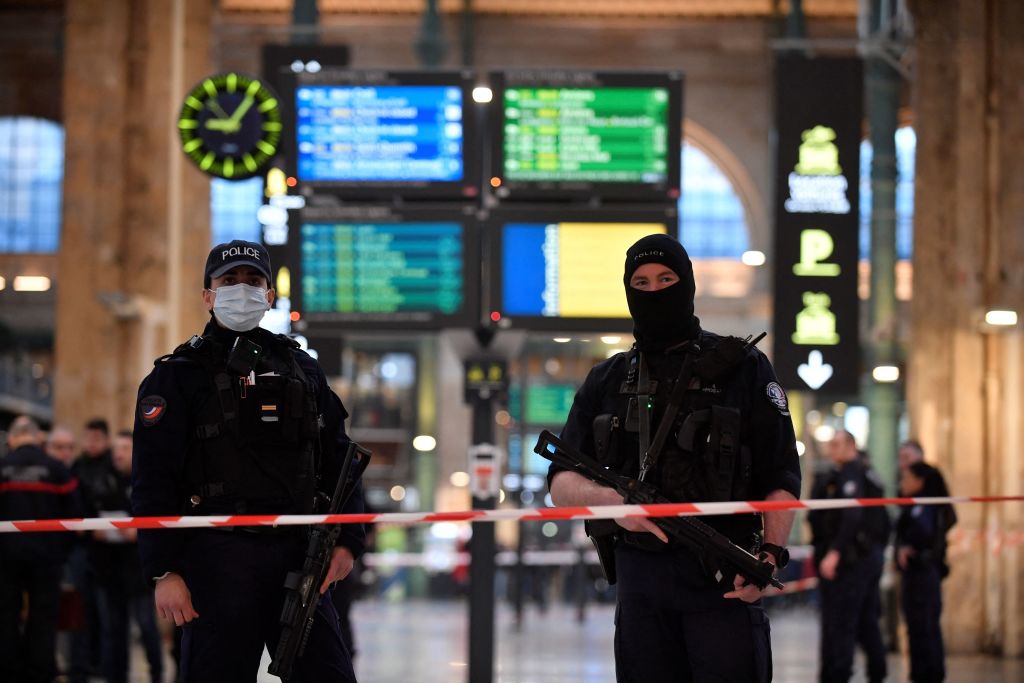The mother of my daughter was at the Gare du Nord on Wednesday morning when a man ran amok with a knife. Six people were stabbed but she was not one of them. I have a friend who wasn’t so fortunate. In July 2016, three members of his family were enjoying the Bastille Day celebrations in Nice when a Tunisian drove a 19-ton lorry along the Promenade des Anglais. They died, along with 83 others, who had the bad luck to be in the wrong place at the wrong time.
This has been the fate of the French since 2015: fingers crossed and hope for the best, a philosophy encouraged by the people whose duty it is to protect them.
‘Times have changed, and we should learn to live with terrorism,’ said the then prime minister, Manuel Valls, the day after the Nice attack. Contrast that insouciance with the urgency shown by Europe’s political elite to address a changing climate.
A feature of Wednesday’s attack is the deafening silence from Emmanuel Macron
Armed police curtailed the knifeman’s rampage at the Gare du Nord, and several details were later revealed about his identity, which were as vague as they were disturbing. It’s not sure when he arrived in France; it was either 2019 or 2020, and there is also uncertainty about his nationality. Is he Algerian or is he from Libya? He said it was the latter last year when, having been served with an expulsion order (known in France as an OQTF – Obligation de quitter le territoire français), he claimed his life would be in danger if he returned to Libya. The authorities agreed and so he remained in France.
Each year on average 120,000 foreign nationals are ordered to be expelled from France but only 5.6 per cent of this number depart. One individual who shouldn’t have been in France was a young Algerian woman now awaiting trial for the brutal murder of a 12-year-old girl in Paris last October.
A feature of Wednesday’s attack is the deafening silence from Emmanuel Macron, and his prime minister Elisabeth Borne, neither of whom felt moved to tweet a message of support to the victims. In contrast, when three Kurds were shot dead in Paris two days before Christmas, allegedly by a Frenchman with a pathological hatred of foreigners, the pair were quickly on social media to condemn the violence and extend their thoughts to the victims and their families.
They were eloquent and fitting responses to a heinous crime, but why has Macron nothing to say to the injured and traumatised victims of this latest act? Perhaps he doesn’t like to confront the downside of what he described last year as the ‘demographic transition’ of France, repopulating the ageing Republic with migrants.
His political opponents aren’t so reticent. ‘The number of illegal immigrants under an OQTF involved in criminal acts is increasing,’ tweeted Marine Le Pen. ‘The future law on immigration must provide a firm and determined response…we will see to it.’
There was a similar question from Eric Ciotti, the leader of the centre-right Republicans, who claimed that the assailant ‘reportedly shouted ‘Allah Akbar’ at the time of the attack’ and asked: ‘When will these OQTFs finally be enforced?’
This claim is contested and, according to Le Monde, the attack is not being treated as a terrorist incident. Define terrorism?
Surveillance cameras captured the knifeman’s assault, which was brief but frenzied; one imagines that the terror experienced by his victims, three of whom were women, will not swiftly subside.
Some of the media, like Macron, would rather not dwell on the incident. It was deemed so insignificant by France 2, the equivalent of BBC1, that it appeared as a brief item two-thirds of the way through the Wednesday evening bulletin, after a lengthy report about the menace of pot-holes on French roads.
Like the government, much of the media no longer knows how to respond to these attacks if they can’t be readily framed as Islamist outrages, organised and perpetrated by members of Isis or al-Qaeda. Others do. Last September, Eric Zemmour, leader of the right-wing Reconquest, coined the term ‘francocide’, after a series of summer outrages, including two fatal stabbings in which the men detained were from Sudan and Libya. Zemmour defines ‘Francocide’ as ‘the beating, rape, murder, knife attack of a Frenchman or woman by an immigrant’.
There was uproar among the bien pensants. One lawyer, Arié Alimi, accused Zemmour of ‘fuelling a sense of fear and insecurity’. Zemmour’s party dismiss the charge. Look at the statistics, they say, and then try and claim that violent crime is not rampant.
Le Pen used Wednesday’s attack to increase the pressure on the government to introduce tough new measures in its upcoming immigration bill, which she and many others fear will promise much but deliver little. Some police share this scepticism. One union representative told Le Figaro:
‘The basic problem with OQTFs is that we can’t send them back to their country of origin because they don’t want to…there are diplomatic difficulties, but if we want to change things, that’s what we have to work on.’
Is Macron the man to effect the change? In a 2019 interview, he vowed that 100 per cent of expulsion orders would be achieved in a short time; four years later he’s short of this target by 94.4 per cent.
In the meantime the French must continue to live with the threat of terror, in all its various forms. Above all, they have to keep trusting to Lady Luck, and hope that the next time a man goes on the rampage they are not in his eye line.







Comments